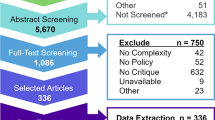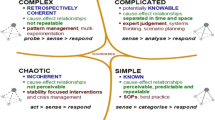Abstract
It has become common to invoke the idea of complexity – understood as intricate and with multiple moving parts – in contemporary policy debates. What do we understand by complexity? What insights does complexity offer public managers? What are the different types of complexities that policy designers and public managers navigate? This chapter explores these questions focusing on the implementation stage of the policy process. The chapter argues that complexity in the implementation stage can be understood at three nested levels. At the macro level, it manifests in the constraints that the policy environment imposes on public managers; at the meso level, it relates to the implementation architecture and the different types of policy tools used; and at the micro level, it relates to calibrating or making changes to these tools. Two arguments are developed. The first is that a nested understanding of complexity can help inform the debate on the specific challenges public managers confront. Second, in the short to medium term, public managers are more likely to address the complexities at the meso and micro levels and will need capabilities to manage or work around those at the macro level.
Similar content being viewed by others
References
Asher, M.G., and A.S. Bali. 2013. Fairness and sustainability of pension arrangements in Singapore: An assessment. Malaysian Journal of Economic Studies 50 (2): 175–191.
Bali, A. S., & Ramesh, M. 2015. Health care reforms in India: Getting it wrong. Public Policy and Administration 30 (3–4) 300–319.
Bali, A.S. 2016. Health system design and governance in India and Thailand. Singapore: National University of Singapore.
Bali, A.S., and M. Ramesh. 2018. Policy capacity: A design perspective. In Routledge handbook of policy design, ed. Michael Howlett and Ishani Mukherjee, 331–344. Boca Raton: Routledge.
———. 2019. Health governance in India: A policy capacity perspective.
Barrett, S.M. 2004. Implementation studies; time for a revival? Personal reflections on 20 years of implementation studies. Public Administration 82 (2): 249–262.
Bova, Elva, Marta Ruiz-Arranz, Frederik Toscani, and H. Elif Ture. 2016. The fiscal costs of contingent liabilities: A new dataset. IMF working paper WP/16/14. Washington, DC: International Monetary Fund.
Brendenkamp, K., S. Bales, and M. Vida Gomes. 2016. Provider payments in the Philippines: An assessment of health financing strategy pillars 3, 4 and 5. Available online at http://documents.worldbank.org/curated/en/217821532358179276/pdf/128732-WP-PUBLIC-ProviderpaymentsassessmentforthePhilippinesfinalsent.pdf
Cairney, P. 2012. Complexity theory in political science and public policy. Political Studies Review 10 (3): 346–358.
Cairney, P., and R. Geyer. 2015. Introduction. In Handbook on complexity and public policy, ed. R. Geyer and P. Cairney. Cheltenham/Northampton: Edward Elgar Publishing.
Candel, J.J.L., G.E. Breeman, and C.J.A.M. Termeer. 2016. The European Commission’s ability to deal with wicked problems: An in-depth case study of the governance of food security. Journal of European Public Policy 23: 789–813.
Capano, G., and M. Howlett. 2020. The knowns and unknowns of policy instrument analysis: Policy tools and the current research agenda on policy mixes. SAGE Open 10 (1): 2158244019900568.
Chindarkar, N., M. Howlett, and M. Ramesh. 2017. Introduction to the special issue: “Conceptualizing effective social policy design: Design spaces and capacity challenges”. Public Administration and Development 37 (1): 3–14.
Choudhury, M., and R.K. Mohanty. 2018. Utilization, fund flows and public financial management under the National Health Mission (No. 18/227) Available onlie https://www.nipfp.org.in/media/medialibrary/2017/11/WHO_PFM_Report_Sep_2017.pdf.
Compton, M., and P. T. Hart(Eds.). 2019. Great Policy Successes. Oxford University Press.
Dickinson, H. 2020. Governments versus the virus: Australia. April 16, 2020. Video available at https://www.youtube.com/watch?v=QFQnkzswEVI
Dickinson, Helen, and Helen Sullivan. 2014. Imagining the 21st century public service workforce. Melbourne: Melbourne School of Government.
Durlak, J.A., and E.P. DuPre. 2008. Implementation matters: A review of research on the influence of implementation on program outcomes and the factors affecting implementation. American Journal of Community Psychology 41 (3–4): 327–350.
Evans, M., G. Stoker, and M. Halupka. 2018. Australians’ trust in politicians and democracy hits an all-time low: New research. The Conversation, December 5.
Funke, J. 1991. Solving complex problems: Exploration and control of complex systems. In Complex problem solving: Principles and methods, ed. R. Sternberg and P. Frensch. Hillsdale: Erlbaum.
Giest, S. 2017. Big data for policymaking: fad or fasttrack?. Policy Sciences 50 (3): 367–382.
Hartley, J., J. Alford, O. Hughes, and S. Yates. 2015. Public value and political astuteness in the work of public managers: The art of the possible. Public Administration 93 (1): 195–211.
Hartley, K., G. Kuecker., and J. J. Woo. 2019. Practicing public policy in an age of disruption. Policy Design and Practice 2 (2): 163–181.
Head, B.W. 2019. Forty years of wicked problems literature: Forging closer links to policy studies. Policy and Society 38 (2): 180–197.
Head, B.W., and J. Alford. 2015. Wicked problems: Implications for public policy and management. Administration & Society 47 (6): 711–739.
Herd, P. 2020. Administrative burdens in crises. Available online at https://youtu.be/FmGvzCg6FKs
Herd, P., and D.P. Moynihan. 2019. Administrative burden: Policymaking by other means. Chicago: Russell Sage Foundation.
Hetherington, M.J. 2005. Why trust matters: Declining political trust and the demise of American liberalism. Princeton: Princeton University Press.
Howlett, Michael. 2019a. Moving policy implementation theory forward: A multiple streams/critical juncture approach. Public Policy and Administration 34 (4): 405–430.
———. 2019b. The policy design primer: Choosing the right tools for the job. London: Routledge.
Howlett, M., and B. Cashore. 2009. The dependent variable problem in the study of policy change: Understanding policy change as a methodological problem. Journal of Comparative Policy Analysis 11 (1): 33–46.
Howlett, M., and R.P. Lejano. 2013. Tales from the crypt: The rise and fall (and rebirth?) of policy design. Administration & Society 45 (3): 357–381.
Howlett, I. Mukherjee, and J. J Woo. 2015. From tools to toolkits in policy design studies: the new design orientation towards policy formulation research. Policy and Politics 43 (2): 291–311.
Howlett, M., and M. Ramesh. 2016. Achilles’ heels of governance: Critical capacity deficits and their role in governance failures. Regulation and Governance 10 (4): 301–313.
Howlett, M., and J. Rayner. 2013. Patching vs packaging in policy formulation: Assessing policy portfolio design. Politics and Governance 1 (2): 170–182.
Howlett, M., M. Ramesh, and A. Perl. 2020. Studying public policy. Vol. 4. Oxford: Oxford University Press.
IMF. 2016. Analysing and managing fiscal risks: Best practices. Available at https://www.imf.org/external/np/pp/eng/2016/050416.pdf. Accessed 13 Oct 2016.
Kettl, D. 2016. Esca** Jurassic government. The Brookings Institution, August 5. https://medium.com/@Brookings/esca**-jurassic-government-5968356dcb0d
Luetjens, J., M. Mintrom, and P. t Hart. 2019. Successful Public Policy: Lessons from Australia and New Zealand (p. 550). ANU Press.
Maor, M. 2012. Policy overreaction. Journal of Public Policy 32 (03): 231–259.
———. 2012b. Risk and policy underreaction. Unpublished paper.
Newman, J., and B.W. Head. 2017. Wicked tendencies in policy problems: Rethinking the distinction between social and technical problems. Policy and Society 36 (3): 414–429.
Nguyen, Ha Thi Hong, Sarah Bales, Adam Wagstaff, and Huyen Dao. 2017. Getting incentives right? The impact of hospital capitation payment in Vietnam. Health Economics 26 (2): 263–272.
Nichols, T. 2017. The death of expertise: The campaign against established knowledge and why it matters. New York: Oxford University Press.
O’Flynn, J. 2019. Rethinking relationships: Clarity, contingency, and capabilities. Policy Design and Practice 2 (2): 115–136.
O’Toole, L.J. 2004. The theory-practice issue in policy implementation research. Public Administration 82 (2): 309–329.
O’Toole, L.J., and K.J. Meier. 2017. Comparative public management: A framework for analysis. In Comparative public management: Why national, environmental, and organizational context matters, 1–26. Washington, DC: Georgetown University Press.
Osborn, R.N., and J.G. Hunt. 1974. Environment and organizational effectiveness. Administrative Science Quarterly 19: 231–246.
Perl, A., M. Howlett, and M. Ramesh. 2018. Policy-making and truthiness: Can existing policy models cope with politicized evidence and willful ignorance in a “post-fact” world? Policy Sciences 51 (4): 581–600.
Peters, B.G. 2015. Pursuing horizontal management: The politics of public sector coordination. Lawrence: University Press of Kansas.
Peters, B. G. 2017. What is so wicked about wicked problems? A conceptual analysis and a research program. Policy and Society 36 (3): 385–396.
———. 2018. Policy problems and policy design. Cheltenham: Edward Elgar Publishing.
Qian, J. 2015. Reallocating authority in the Chinese health system: An institutional perspective. Journal of Asian Public Policy 8 (1): 19–35.
Ramesh, M. 2013. Health care reform in Vietnam: Chasing shadows. Journal of Contemporary Asia 43 (3): 399–412.
Ramesh, M., and A.S. Bali. 2019. The remarkable healthcare performance in Singapore, Chapter 3. In Great policy successes, ed. Mallory Compton and Paul ‘t Hart. New York: Oxford University Press.
Rittel, H.W.J., and M.M. Webber. 1973. Dilemmas in a general theory of planning. Policy Sciences 4: 155–169.
Stirling, A. 2010. Keep it complex. Nature 468 (7327): 1029–1031.
Tangcharoensathien, V., and P. Jongudomsuk. 2004. From policy to implementation: Historical events during 2001–2004 of universal coverage in Thailand. Nonthaburi: National Health Security Office.
Tanzi, V. 2011. Government versus markets: The changing economic role of the state. Cambridge: Cambridge University Press.
Termeer, C.J.A.M., A. Dewulf, G. Breeman, and S.J. Stiller. 2015. Governance capabilities for dealing wisely with wicked problems. Administration and Society 47: 680–710.
Turner, A. 2012. Economics after the crisis: Objectives and means. London: MIT Press.
Van der Wal, Z. 2017. The 21st century public manager. London: Macmillan International Higher Education.
Wellstead, A., M. Howlett, and J. Rayner. 2015. How useful is complexity theory to policy studies? Lessons from the climate change adaptation literature, Chapter 24. In Handbook on complexity and public policy, ed. Robert Geyer and Paul Cairney, 399–413. Cheltenham: Edward Elgar Publishing.
Wu, X., and M. Ramesh. 2014. Market imperfections, government imperfections, and policy mixes: policy innovations in Singapore. Policy Sciences 47 (3): 305–320.
Wu, X., M. Ramesh, and M. Howlett. 2015. Policy capacity: A conceptual framework for understanding policy competences and capabilities. Policy and Society 34 (3–4): 165–171.
Acknowledgments
Many thanks to Kris Hartely, Helen Dickinson, and Mike Howlett for constructive comments and suggestion on this chapter.
Author information
Authors and Affiliations
Corresponding author
Editor information
Editors and Affiliations
Section Editor information
Rights and permissions
Copyright information
© 2021 The Author(s), under exclusive license to Springer Nature Switzerland AG
About this entry
Cite this entry
Bali, A.S. (2021). Navigating Complexity in Policy Implementation. In: Sullivan, H., Dickinson, H., Henderson, H. (eds) The Palgrave Handbook of the Public Servant. Palgrave Macmillan, Cham. https://doi.org/10.1007/978-3-030-29980-4_28
Download citation
DOI: https://doi.org/10.1007/978-3-030-29980-4_28
Published:
Publisher Name: Palgrave Macmillan, Cham
Print ISBN: 978-3-030-29979-8
Online ISBN: 978-3-030-29980-4
eBook Packages: Political Science and International StudiesReference Module Humanities and Social SciencesReference Module Business, Economics and Social Sciences




